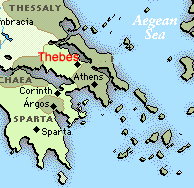Guiding Question: Are We Prisoners of Fate?
Are we prisoners of fate? And even if we are to one degree or another, does that release us from responsibility for our acts, whether in whole or in part? And does Sophocles' Oedipus the King offer answers?
Think back to the Critchley reading and claims made there about how
- "we collude, seemingly unknowingly, with the calamity that befalls us"
- the Oedipus the King (OTK), as the (supposed) template for all tragedy (literary, experiential), "In its movement from a delusional self-knowledge and the fantasy of an unencumbered freedom to an experience of an insight into truth that costs us our eyes, ... gives voice to an experience of agency that is partial and very often painful"
- "In tragedy, time is out of joint, and the linear conception of time as a teleological flow from the past to the future is thrown into reverse"
- "Tragedy has a kind of boomerang structure where the action that we throw out into the world returns to us with a potentially fatal velocity"
- "[W]e are tyrants, too"
Text Access
Sophocles. The Three Theban Plays. Trans. Robert Fagles. Penguin Classics. New York: Penguin Books, 1984. (Available via bookstore.)
Background
See also the study guide to Antigone.
Mythological

When Oedipus the King starts, Oedipus, who, people think, is the son of king Polybus of Corinth (that will change), has already been made king of Thebes, and been given in marriage to Jocasta, the widow of Laius, Thebes' late king. That's for slaying the Sphinx, whose riddle Oedipus has solved. But Thebes languishes under plague; Creon, Oedipus' brother in law, has been sent to Delphi to find out what can be done.
The drama of the play unfolds mostly in connection with Oedipus' understanding of the full import of the situation.
Oedipus' ankles and name. Oedipus literally translates as "swell-foot." As a newborn, Oedipus was handed over to a servant to be left on a mountainside to die — that so as to avoid fulfillment or the oracle predicting he would kill his father and marry his mother.
Historical
We don't know the exact date of Oedipus the King, but we think it was written after the year 429 BCE, a period of ongoing crisis (war, plague) for Athens. It therefore comes after the Antigone in terms of production chronology, though its story takes place prior to Antigone.
Given the likely date of its composition, the play surely will have resonated with its original audience in terms of the key circumstance immediately motivating its action: the Great Plague of Athens, which decimated the city's population during the period 430-426 BCE and killed its greatest ever leader, the statesman Pericles — and all that already at a time of great crisis for the city, which was fighting what would prove a decades-long war with Sparta and its allies, a war that would eventually bring Athens to its knees.
So, do you think any of this might be reflected in the text? If so, how so? Athens, where the play was produced, was at the time a democracy, while Thebes, sworn enemy of Athens, was an oligarchy.
General Questions
- "Pride breeds the tyrant," hubris phuteuei turannon.
What is a tyrant? Is Oedipus one?
- What "moral code," if any, lies behind the play?
People talk about the role of fate, of chance, of justice, of the gods, of personal responsibility and freedom, and so on. Is Oedipus guilty, and if so guilty of what, and how so? How does he behave as father? As son? As husband? As king? HOW HAVE WE MOVED BEYOND THE MORAL UNIVERSE OF ANTIGONE (if we have done so)? - Is it a good thing what happens to Oedipus? Does he grow, does he benefit from the ordeals this play puts him through? Or are these growing pains you wouldn't wish on your worse enemy? To learn, is it necessary to suffer?